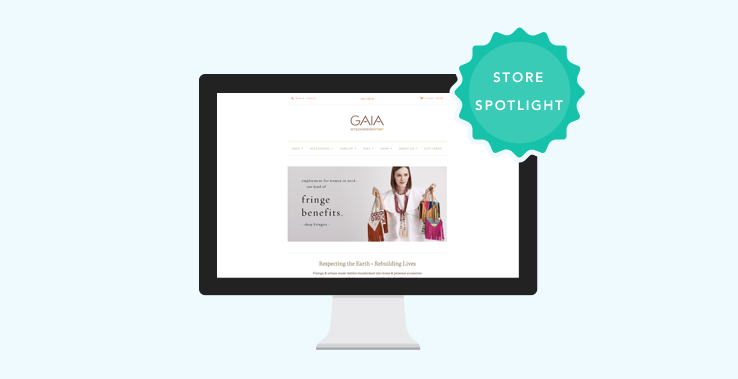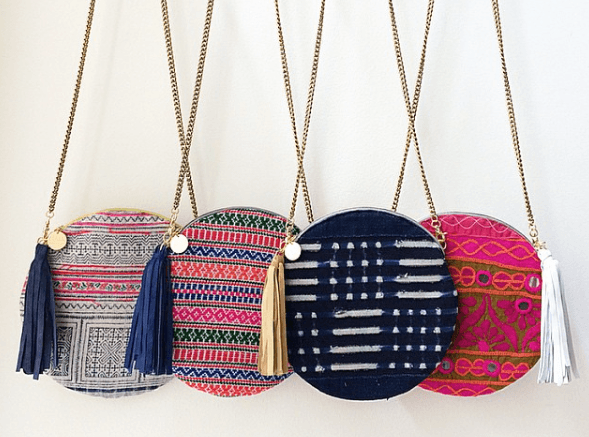
Store spotlight: GAIA Empowered Women
In our customer research, we’re always keeping an eye out for stores with inspiring stories to tell. So when we found out about GAIA Empowered Women, a Dallas-based company that employs refugee women, we knew we had to get to the bottom of their story.
Paula Minnis, GAIA’s founder, joined the fashion industry right out of college. She started as a buyer, then moved to Los Angeles, where she worked as a merchandiser for Ralph Lauren. After more than a decade in the industry, however, Paula became disenchanted by the high-stress environment. “We were selling dresses, not curing cancer,” she says.
Paula moved to Dallas with her family and decided to take some time off from work. It was there that she got involved with the International Rescue Committee (IRC), a non-profit organization that works to resettle refugees. In 2009, she met Catherin, a Burmese woman who had recently arrived in Dallas with her children after spending more than 10 years in a refugee camp in Thailand. Paula helped Catherin through a series of new challenges, which included everything from learning how to use a stove, to how to use an ATM, to how to mail a letter.
Around the same time, Paula had been reading about microfinance (financial services for low-income individuals and entrepreneurs). She was especially interested in the global empowerment of women, and had read Nicholas Kristof and Sheryl WuDunn’s Half the Sky, which describes the oppression of women worldwide as "the paramount moral challenge" of our present era. The book argues for women earning a living wage and becoming self-sufficient, which it says has a lasting, positive legacy for families and communities.
One day, while Paula and Catherin were going over English vocabulary words in Catherin’s apartment, they came upon the word “sew.” Paula drew a spool of thread on a piece of paper to represent the word. Catherin, understanding, brought out her own spool of thread. Realizing then that Catherin could sew, Paula had what she describes as “a lightbulb moment.”
“I had been trying to brainstorm ways for Catherin to support herself,” Paula says. “Suddenly, I thought, ‘What if I gave her something to sew and then I brought it to market?’ She could earn a living from home and still be with her children.”
The idea paired well with another of Paula’s developing interests, what she calls “living lightly on the earth, using less, producing less waste.” She had recently begun collecting vintage textiles and shifted her household to using cloth napkins. She thought, “Why don’t I gather vintage fabrics and give them to Catherin and have her sew cloth napkins?”
She bought a sewing machine for Catherin to use under a “buy-back” program that let Catherin repay Paula with cash or completed products, and eventually own her own equipment, take on other work, and earn additional income. The cloth dinner napkins Catherin sewed, Paula collected and took to retail stores, as well as trunk shows and local markets. She decided to name the line GAIA after the Greek goddess of the earth, and sold products at a higher wholesale price to ensure that the refugee workers earned a fair living wage.
Today, GAIA’s workers (all of them hired through the IRC) include refugees from Burma, Iraq, Iran, the Democratic Republic of the Congo, and, most recently, Syria. The product line has expanded based on the women’s capabilities: as more skilled seamstresses came aboard, the line evolved to include different styles of handbags, pouches, pillows, jewelry, and more.

In 2011, while Paula was pregnant with twins, she hired a second full-time employee, one of whose first tasks was to direct the launch of GAIA’s online store. They initially built the store on Magento and sent out an email blast announcement. So many customers had asked if GAIA had an online store that Paula was sure the orders would begin rolling in immediately.
“We got nothing,” she says. “As someone who knew nothing about ecommerce, it was very eye-opening to learn that just having an online store does not equate to instant sales.” In late 2013, they shifted the business to Shopify, and in 2014 the company began making its first online sales.
Since then, GAIA’s revenues have jumped dramatically, with a 1,000-percent year-over-year increase from 2014 to 2015. Their products are sold in several additional online stores, along with brick-and-mortar stores in 14 states, and even locations in Australia and Japan—but it’s GAIA’s online store that Paula sees as key to the brand’s growth.
“Several things have been important for our success,” she says. “The first was really maximizing our website and presentation. We also invested in professional photography, which has helped us a great deal in terms of defining our brand and making our website look beautiful. And as far as getting people to the website in the first place, social media has been huge.”
Paula, whose twins are now four years old, spends most mornings working on her laptop before picking them up from school. In the afternoons, she goes into the GAIA office, an 800-square-foot space in Dallas where the refugee women work several days a week. GAIA’s in-house team includes a director of operations, a production assistant, and a merchandising coordinator. Paula also has part-time help with accounting and social media.
“We’re so small, so everybody wears a lot of different hats,” she says. “Everybody needs to be ready to roll their sleeves up and be adaptable. Fortunately, everyone I work with is very entrepreneurial in spirit, which I think is key for a small business.”

Paula says that one of the greatest benefits of running her own business is having the flexibility to be in different places at different times. As the head of GAIA, she’s responsible for many different areas, from design to sales to marketing to accounting. She says she’s learning to segment her days better, as well as relying on those around her. During the most recent holiday season, she hired a part-time PR firm that focuses on social enterprises and digital influencers. That helped GAIA expand its reach and led to increased holiday sales.
“There’s no blueprint for what we’re doing,” Paula says. “Social enterprises exist, but ours is more holistic in its involvement. We oversee everything from the design to production. We’re meeting with the women multiple times a week, helping train them and develop them further.”
When it comes to advice for other business owners, Paula encourages merchants to have a distinct message for their brand. She believes GAIA has benefited from keeping its vision and approach simple, resisting the urge to expand too much.
“I’ve found that the most successful companies have their core competency,” she says. “For us it’s about refugee women and textile-based products. Those constraints help us stay focused and on message.
Overall, I think it’s important to remain cohesive with how you market and promote your brand. In everything you do, try to stay within that message.”
Learn more at GAIA Empowered Women GAIA uses Pixel Union’s Atlantic Shopify theme